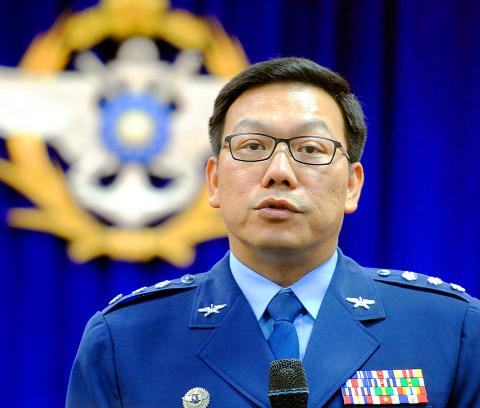|
Justin Lin is still
wanted for treason, ministries say
FUGITIVE MADE GOOD: Lin swam to China and
defected in 1979, later becoming World Bank vice president, an offense for which
the statute of limitations has not ended
By Rich Chang / Staff reporter

Colonel Shen Shih-wei, deputy
director of the defense ministry’s Judicial Department, tells reporters in
Taipei yesterday about the ramifications of changes to the Code of Court Martial
Procedure.
Photo: Fang Pin-chao, Taipei Times
Both the Ministry of National Defense and
the Ministry of Justice said yesterday that Justin Lin (林毅夫), who defected to
China in 1979 and later became a vice president at the World Bank, is still a
fugitive wanted on treason charges, whose prosecution has not even begun.
Officials from the ministries made the remarks after the reform of the Code of
Court Martial Procedure (軍事審判法), which subsequently reopened the debate over
whether to allow the return of one of the country’s best-known defectors.
President Ma Ying-jeou (馬英九) yesterday promulgated an amendment to the court
martial code, signaling that as of tomorrow, military personnel facing trial
during times of peace will have their cases handled in civilian courts. The
revised Code of Court Martial Procedure cleared the legislative floor on Tuesday
last week with the support of lawmakers across the political divide.
The first phase of changes means that crimes of abuse or improper punishment of
subordinates, prevention of filing grievances, obstruction of sexual autonomy or
manslaughter committed by servicemen will be subject to the Code of Criminal
Procedure (刑事訴訟法). Other offenses will likewise be subject to civilian trials
starting five months later.
Under the revised law, ongoing cases currently under investigation, trial or
execution by the military justice system must be turned over to civilian courts
to be completed. With the newly adopted reform, the justice ministry and a
civilian court will decide whether the warrant for Lin’s arrest has expired.
Defection to an enemy state is punishable by death, life imprisonment or a
minimum of 10 years in prison under the Criminal Code of the Armed Forces
(陸海空軍刑法).
The law’s statute of limitations is 20 years, but the defense ministry says Lin
should continue to be listed as a fugitive because he has been in a constant
state of defection.
Vice director of the defense ministry’s Judicial Department Colonel Shen Shih-wei
(沈世偉) yesterday cited Article 80 of the Criminal Code, which states that
prescription of prosecution begins when the alleged criminal offense is
committed, but for a continued offender, the prescription of prosecution begins
only when the conduct of the alleged offense ends.
Shen told a press conference held at the defense ministry yesterday that Lin’s
act of treason has been continuing since he defected to China in 1979 and that
after consulting with the justice ministry last year, the ministry ascertained
that as a continued offender, Lin’s prescription of prosecution has not even
begun.
Lin remains on the wanted list, Shen added.
Following the reform of the Code of Court Martial Procedure, Shen said that in
the first stage, about 250 people would be transferred to civilian prisons.
In the second stage, general-level military personnel who are detained or are
serving terms are expected to be transferred to civilian prisons five months
later, he said, adding that cases of treason and other serious crimes, including
Lin’s case, would be transferred to the civilian judiciary in the second stage,
five months later.
Lin, 60, was born in Yilan. While serving as a captain in the army, Lin was held
up as a role model for his decision to drop out of the prestigious National
Taiwan University and join up.
However, he defected to China in 1979, by swimming from Kinmen to China’s Fujian
Province.
Lin received a master’s degree in Marxist political economics from Peking
University in 1982, and a doctorate in economics from the University of Chicago
in 1986, becoming one of the first Chinese citizens to earn a doctoral degree
during the early stages of economic reform in China.
In 2008, he was named a senior vice president and chief economist at the World
Bank.
In May 2002, Lin filed an application from Beijing to return to Taiwan to attend
his father’s funeral. The government approved his application, but warned that
he could face charges of treason if he returned. Lin decided not to risk
detention and did not attend his father’s funeral.
Additional reporting by CNA
|
![]()
![]()
![]()